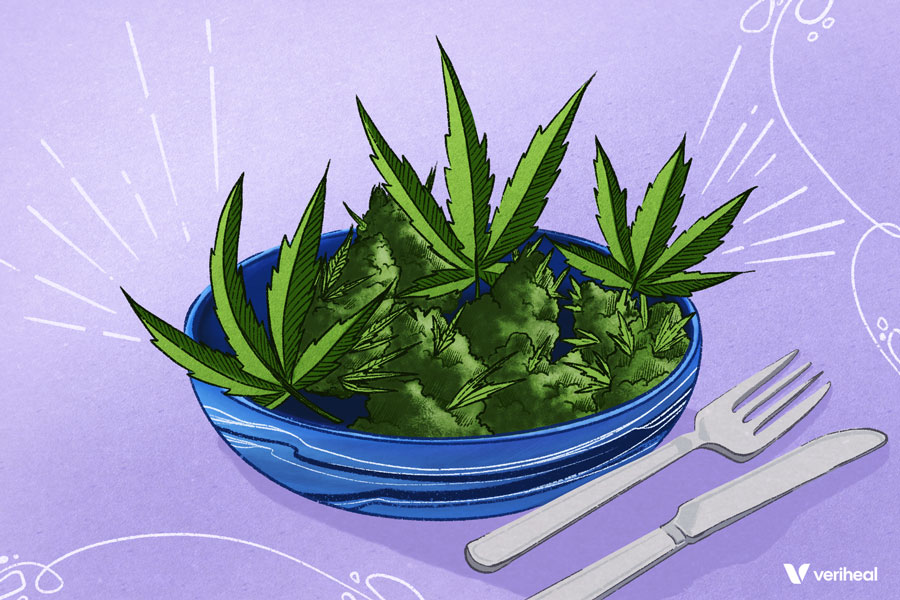When it comes to current marijuana culture, consuming raw cannabis is an increasingly popular practice among both recreational and medicinal cannabis users. However, there’s still a lot of confusion surrounding this trend. Can eating raw marijuana make you high? Does it really matter if the plant has or hasn’t undergone decarboxylation?
In this article, we’ll explore how consuming raw cannabis affects the body and the benefits (if any) of using it unfettered by heat and time.
Does Eating Raw Marijuana Actually Get You High?
From a chemical standpoint, the answer is a resounding “no.” Although eating cannabis raw will not make you high, there is still plenty of evidence to show that it can be incredibly beneficial.
In cannabis plants, cannabinoids require heat activation to reach their full effects—otherwise known as decarboxylation. Despite this, there is an abundance of scientific research showing how consuming raw cannabis can provide the body with nutrients, antioxidants, and other health benefits when you ingest the whole plant. In addition, studies suggest it can positively affect the body and immune system through its anti-inflammatory properties.
What Are the Benefits of THCA vs. THC?
As a first step to discovering the potential benefits contained in raw cannabis, understanding the distinction between raw THCA and THC is key. The two components identical in name might seem similar at first glance, but they provide vastly different experiences when consumed.
THCA, or tetrahydrocannabinolic acid, is a non-psychoactive cannabinoid found naturally within marijuana plants. Once decarboxylated, it transforms into psychoactive THC, increasing its strength exponentially.
Cannabis users enjoy the effects of decarboxylated THC due to its ability to offer a relaxed mental state and physical relief from body aches and pains.
Though from the same chemical family, THCA is different from THC because it does not bind to CB1 or CBD2 receptors of the endocannabinoid system, which are essential for feeling any euphoric effects. Instead, it activates other receptors that do not cause a person to experience any psychotropic response. This property makes this compound a desirable alternative if individuals want to benefit from the potential advantages of cannabis without feeling “high.”
For example, THCA could be a powerful anti-inflammatory agent, helping combat autoimmune diseases and cancer. Whether using an extract or straight from the plant, raw cannabis may become widely used for its medicinal properties if current investigations into THCA continue to produce positive results.
Are There Benefits of Consuming Raw Terpenes?
Terpenes are responsible for providing cannabis with its trademark aroma and taste. Working together in harmony with cannabinoids, research shows these two components combine to create a powerful synergistic entourage effect that could explain why certain cannabis varieties deliver more intense effects than others.
Why You Should Get Your Medical Marijuana Card
Veriheal has satisfied millions of patients nationwide by giving them access to these benefits
- Larger purchase limits
- Peace of mind
- Enhanced legal protection
- Access to higher potency strains
- Save up to 25% on cannabis purchases
- Skip the line at the dispensary
As a result, consuming raw terpenes has become a desirable practice in the medical marijuana industry as they have been found to affect one’s mood and energy levels and can potentially enhance the healing qualities of THC. While most of these compounds are lost during traditional smoking or cooking methods, consuming raw cannabis ensures that the original complement of terpenes remains intact, giving consumers all the potential benefits of cannabis minus the high.
What Are the Benefits of CBD vs. CBDA?
Non-psychoactive CBD and its precursor cannabidiolic acid, or CBDA, may sound like two similar substances, but they actually hold distinct differences in their chemistry and benefits.
Whereas CBD is widely known for its power to reduce inflammation, act as an antioxidant, and relieve anxiety, studies have also found that CBDA has even more potential therapeutic benefits.
Known as the “parent molecule” of both CBD and THC, CBDA appears to be over 200 times more powerful than traditional CBD in terms of its anti-inflammatory and neuroprotective properties. Additionally, one study has shown that CBDA is nearly 1,000 times more effective than CBD in treating nausea and anxiety. However, as with THCA, decarboxylation must occur for CBDA to become an active compound.
What’s the Best Way to Consume Raw Cannabis?
While some heated debate exists on how best to consume raw cannabis, as most of its beneficial components are heat sensitive, one of the simplest and perhaps most enjoyable methods is to juice it.
Juicing actively preserves and concentrates many of the vitamins, minerals, flavonoids, cannabinoids, and terpenes found naturally in cannabis, making them bioavailable for consumption without having to be heated or exposed to digestive enzymes first. Plus, as a bonus, adding just a couple of raw cannabis leaves blends surprisingly well with other leafy greens and fresh fruit juices, potentially creating a deliciously supercharged green smoothie.
So, if you can grow your own or have access to an abundance of raw cannabis leaves, juice it to reap the highest profile of benefits the plant offers in its most natural state.
The Bottom Line
In conclusion, while consuming raw cannabis will not get you high, it is a unique way to experience its therapeutic effects. Whether as part of your next smoothie or part of a healthy salad, if you experiment with incorporating raw cannabis into your diet, make sure to ease into it to see how you react to this new consumption method.
While more study is needed to determine exactly what dosage is required to fully reap the benefits of raw cannabis, even small amounts of uncooked cannabinoid-rich material can be a great addition to healthy diets. So, bon appétit and happy juicing!
Note: The content on this page is for informational purposes only and is not intended to be professional medical advice. Do not attempt to self-diagnose or prescribe treatment based on the information provided. Always consult a physician before making any decision on the treatment of a medical condition.
Author, Share & Comments
















